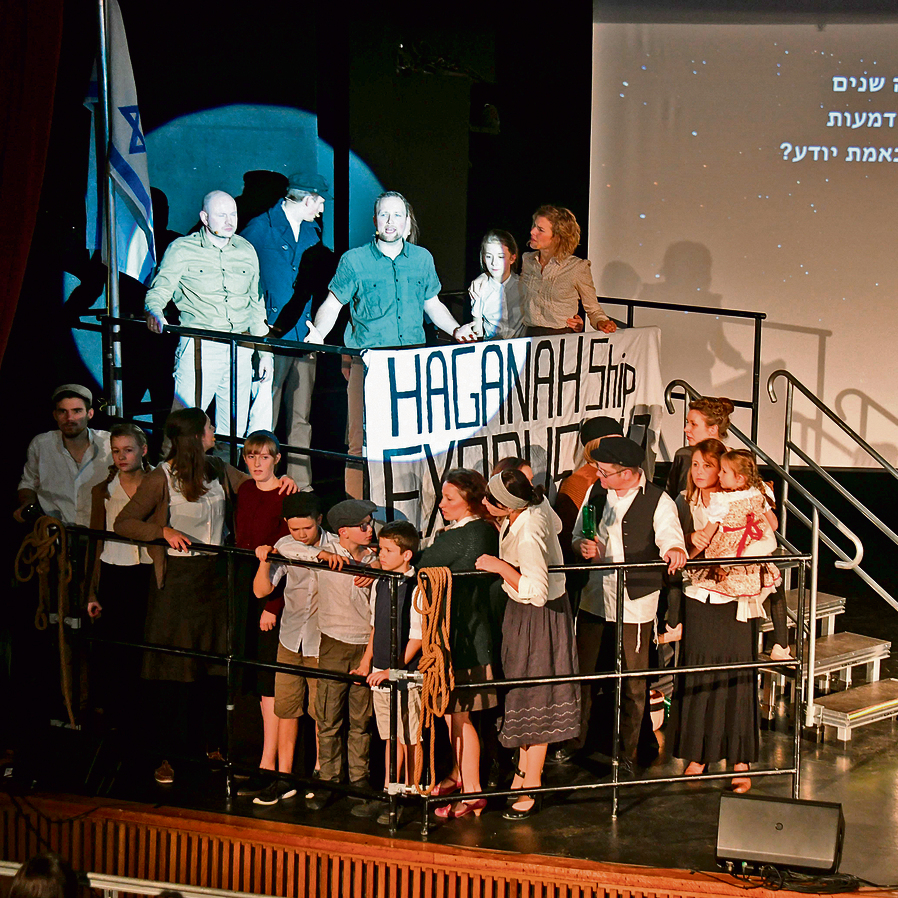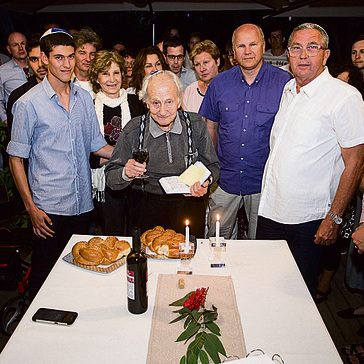This mnoth, a delegation of 50 Germans, all second or third generation descendants of Nazi soldiers, arrived in Israel to participate in the Musical Exodus 1947, in memory of my father Noah Klieger, who recently passed away at 92.
The actors wanted my father to be on the first row, but fate intervened, and he passed away just a week before the play’s debut. I sat in for him, teary and excited. I arrived straight from the cemetery, were the family convened a week after his passing, and couldn’t help thinking of how much he would have loved to be here—in a hall filled with teens from the nearby school and Holocaust survivors, all here to learn about his life story.
On July 10, 1947, Holocaust survivor Noah Klieger boarded the boat known as the President Warfield, which later became called the Exodus. My father was one of the crew members who fought the British army at sea, in an attempt to make it to the land of Israel. The British forces managed to prevent the ship from making port, and deported the thousands on board to the nearby island of Cyprus.
My father’s story is what legends are made of, and both the fate of the Jewish people and my personal destiny as Noah’s daughter, are a part of this legend. It’s no wonder that these events inspired stage performance.
The March of Life members, who also thought that these stories were worth telling, sent a message to my father, asking to meet with him. They met in Caesarea for the first time a year and a half ago, on a Friday afternoon. That’s when the group members told him that they wanted to direct a play documenting his life story.
My father told them of his memories of the Holocaust and all about his adventures at sea onboard the Exodus. By his side were my mother, Jacqueline, and my eldest son Yuval. I’ll never forget the text message I got from Yuval, saying: “Mom, you don’t get what’s going on here. This isn’t just another lecture that he’s giving—they’re all descendants of Nazis. They’re descendants of war criminals who murdered Jews in cold blood.”
I have to admit, I fidgeted in my chair when I got this message.
“So what is grandpa doing there?” I replied.
“It’s not what you think mom,” he reassured me. “These young Germans are trying to atone for their grandparents’ sins. They’re good Germans.”
I started sobbing as he described the scene: “They came here with a guitar and they’re playing Hava Nagila, grandpa even said kiddush and grandma lit candles with them. There’s another kind of German, who believe in Israel and support Judaism, and they want to prove that they’re our friends.”
Afterwards, my father told me more of the meeting. “They were brave and they told me that their grandparents were in the SS or the Wehrmacht. Some were even actively involved in the annihilation of Jews during the Holocaust,” he said.
“They are devoted to making sure that memorial marches take place around the world, in the spirit of the March of the Living," my father said. The March of the Living has been taking place on Holocaust Memorial Day for 30 years.
And so, I learned that these young Germans, who feel burdened by their family history, march through different German cities, from one concentration camp to another, mainly in Eastern Germany—where most of them are from.
Then my father, in his unmistakable Noah style, told the group that the meeting was exciting but that “it doesn't change what I think of their ancestors. But I promised them that I’ll try to believe that in several generations time, the mindset of the German people, who tried and almost succeeded in annihilating the Jewish people, will change.”
But something, perhaps the emotional aspect of the occasion, made my father keep in touch with this organization and its people. On their part, they fell in love with him—with this brave and determined man, who didn’t even speak nicely to them during their first meeting. I saw how in the following months, the bonds became closer, and how hearts opened as memories rose from the abyss.
Just two weeks before my father died, after a treatment session at the hospital, two members of the group came to visit him in his Tel Aviv apartment, to invite him to their play in a school auditorium in mid-December. My father was excited to learn that his life story has become a musical—and promised to attend.
But fate intervened, and he died a week before the musical went on. Some of the March of Life members came to the funeral, and cried over the fresh grave like they were family. And we were there, at the play, straight from the memorial service at the cemetery after completing the seven day mourning period.
The Piper family traveled to Israel for the occasion, and their two daughters, Anna Suzete (16) and Jordena (12) perform roles in the play. The parents, Frank and Barbel, always knew that some part of their respective family histories was hidden from them. But it was only later in life, when they both started asking that they learned that they’re both grandchildren of Nazi party members who were actively involved in the murder of Jews.
“I’ll never forget what I felt when I learned who my grandfather really was, and what he did,” said Barbel. “I was shocked. He served in the Nazi armed corps, and had a senior position at Auschwitz, where he was the one responsible for ordering the rows of people on their way to the gas chambers. He was also the one who engineered the electric fence at the camp,” she said.
“This image will be in my mind for as long as I live. That’s why we march,” said Barbel.
You knew nothing of this as a child or a teen?
“No. We were told that out grandfather didn’t participate in the war because of his medical condition. I was shocked when I discovered that this medical condition didn’t prevent him from becoming a senior officer at Auschwitz—the electrical engineer there,” said Barbel. “He supervised the installation of 16 kilometers of electric fences, onto which so many desperate people threw themselves, after they couldn’t bare their misery.”
Frank’s family story is a bit different. His family was openly racist and anti-Semitic and would make such remarks on a daily basis. His maternal grandfather was a sniper in a commando unit that fought with the Wehrmacht, and committed numerous war crimes.
“Besides slaughtering partisans in the east,” said Frank with tremendous pain, “his unit had the 'elite' mission of murdering Jews in the Netherlands prior to the Wehrmacht’s arrival. Long hours of research revealed my horrible family history. It’s important for me to talk about it wherever I can. Since I found out about this, I am never silent when I witness anti-Semitism in daily life.”
Frank and Barbel both declare that such things should never happen again. “We will continue to stand by Israel and protest against any kind of anti-Semitism," they stated.
This couple, alongside their two daughters, chose to march in order to fight anti-Semitism worldwide. Who knows, perhaps my father was right in saying that there’s a slight chance of hope.
About the March of LifeThe March of Life is an initiative by Jobst and Charlotte Bittner. Jobst shares a grim family history, like other organization members, and discovered his grandfather’s Nazi past by mistake. “I discovered the truth eight years ago, but the desire to do something came earlier. I always knew that the silence about these events must end,” he said.
The organization was founded in 2007 with the support of the Evangelical Church from the Black Forest region. So far, its members have so far marched in 250 cities, in 20 countries around the world, alongside Jewish and Christian communities. “We call it: ‘Remembering, making peace and taking a stand for Israel,” Jobst concludes.
More information about the March of Life organization can be found here.
How the offspring of Nazis celebrated my father the Holocaust survivor : http://bit.ly/2ETAqJ4

No comments:
Post a Comment